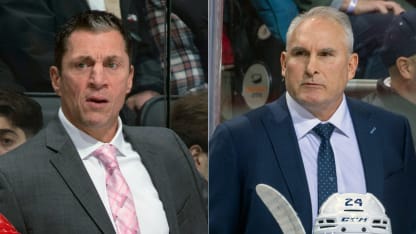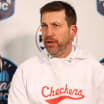In 1,484 NHL games, Rod Brind’Amour, now the coach of the Carolina Hurricanes, had 1,184 points, 1,025 more than Craig Berube (159).
In 1,054 NHL games, Berube, now the coach of the Toronto Maple Leafs, had 3,149 penalty minutes, 2,049 more than Brind’Amour (1,100).
As players, it would be difficult to find more polar opposites.
And yet, with the Hurricanes and Maple Leafs facing off at Lenovo Center on Thursday (7:30 p.m. ET; HULU, ESPN+, TSN4), the game will feature two of the better coaches in the NHL for the past few seasons.
The common thread?
“Work ethic,” Brind’Amour said. “[Berube] never took a shift off, and that’s carried over into his coaching. Doesn’t matter if you’re a great player or a fringe player, there is an expectation to play hard every shift.
“That’s non-negotiatiable.”
Berube echoed those sentiments when it came to Brind’Amour.
“Whether it was in the gym or on the ice, he never stopped working and you can see that hasn’t changed as a coach,” he said. “The players see that.
“He sets the tone.”
Berube and Brind’Amour had a brief stint as teammates with the Philadelphia Flyers from 1998-2000. Over the next two-plus decades they made separate transitions from the ice to behind the bench and, in each case, the results speak for themselves.
In this, Berube’s first season with Toronto, the Maple Leafs are 27-13-2 and lead the Atlantic Division with 56 points. They’ll bring a season-high five-game winning streak into this game following a 3-2 victory at the Flyers on Tuesday.
In 585 career games as an NHL coach with Philadelphia, the St. Louis Blues and Toronto, Berube has led his teams to a 308-203-74 record and guided the Blues to the Stanley Cup in 2019.
“The one thing about coaching, which I think we both have, is that once your playing career is done, you don’t want the whole thing to go away,” Berube said. “You want to stay part of it. I didn’t want this to go away. This was my life, I loved it, and I still love it. There's nothing better than coming to the rink and being around the guys and the team. I think that’s the way a lot of guys think who want to go on to coach.
“When I look at 'Roddy,' he was playing in Carolina. That was his home. When he stopped playing he started to work with the team a bit, and he probably got the itch to get more involved. And to do things his own way.
“I think, as coaches, when I was an assistant I wanted to be a head coach one day. That’s why I went to the minors twice. Because I wanted to run a team my own way. And I think that’s Roddy’s case too. He probably wanted to do things his own way, and he’s been successful at it. His teams are hard to play against and are very prepared, just like he was. And is.”















